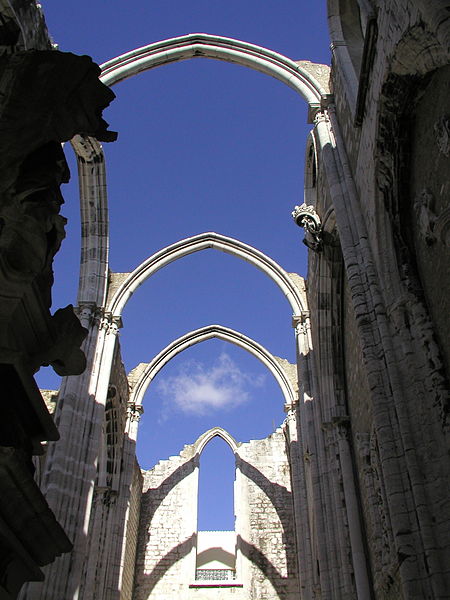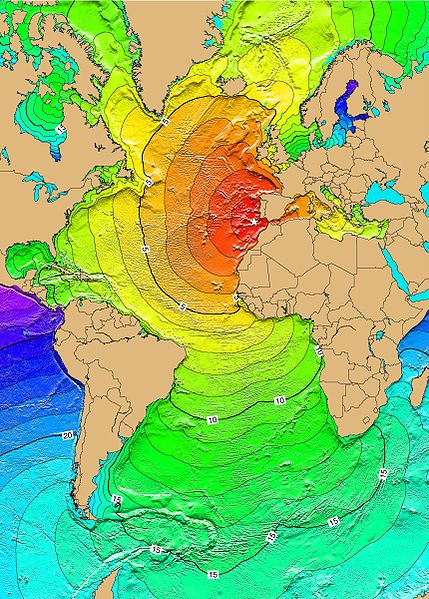Towards the end of this month we'll be going to Lisbon, Portugal, for a few days for no other reason than we've never been there before and we got a good deal on a hotel. We normally go to a European capital city in December for the atmosphere and the Christmas markets. We'll be a little early this year. Such is the joy of semi-retirement and all chicks having flown the nest.
Devoutly Catholic Lisbon was the site of a major disaster in 1755 when large areas of it, and the surrounding area and coastline of Portugal, were destroyed by a massive earthquake and tsunami which was to set up major shockwaves in European culture and philosophy which are still being felt today.
The earthquake struck on All Saints Day, a religious public holiday on November 1, at about 09:30 a.m. local time, as Africa moved a little further north on a journey which has pushed the Iberian Peninsula and Italy north, raising up the Pyrenees and the Alps, and the Chiltern Hills in southern England as a secondary ripple and caused the depression now filled with the Mediterranean.
The earthquake's strength has been estimated as 8.5 - 9.0 on the Richter scale with it's epicenter about 120 miles off shore. Morocco was also hit and suffered major damage. Eighty-five percent of Lisbon's buildings were destroyed, including the Lisbon Cathedral, all major churches, the largest hospital where hundreds of patients burned to death, the national archives including detailed records of voyages of exploration by Portuguese navigators such as Vaso da Gama, the royal palace, the 70,000 volume royal library, hundreds of works of art by Titian, Rubens, and Correggio and the Carmo Convent.
Survivors of the initial shock sought safety in the open and congregated around the dock on the Tagus River estuary where they saw the sea drain out of the bay revealing the remains of shipwrecks and lost cargo, only to have it engulf them 40 minutes later when it came roaring back again in the form of a 60 feet high tsunami travelling at the speed of a galloping horse. Two more waves followed. The tsunami radiating out across the Atlantic also devastated the coast of north-west Africa, the Azores, the Caribbean, parts of southern England and possibly even Greenland.
One consequence of the disaster was that King Joseph I became severely claustrophobic and refuse to live inside walls, moving his entire court to a huge complex of tents on a hill on the outskirts of Lisbon.
In Lisbon alone the death toll was put at between 10,000 and 100,000, with the true figure probably close to 50,000, many of them in church at the time and in a country noted for it's piety and support for the Catholic Church. The only area of Lisbon to survive to any extent was Alfama, the red light district.
The earthquake of 1755 was thus one of the deadliest earthquakes on record and the worst in recorded European history but its aftershock on European culture was also profound. It caused many people in the early days of the 'Age of Enlightenment' to ask some very fundamental questions about a Universe which had been assumed to be supervised by a benevolent god - the Christian God, naturally - where the answer to every question was "God did it!" How could a disaster on this scale, and with apparent indifference to the piety and 'godliness' of its victims, occur in the presence of a benevolent god?
Theologians, desperate to keep their power and privilege, did what they always do in such times and smugly announced that it was all the victims' fault and exactly what they deserved. God did it! They had obviously offended God in some way and he was merely showing his displeasure. Apparently he was displeased with children, the sick, nuns, whole congregations at prayer together with their priests, the pious and impious equally, but he saw fit to spare the prostitutes and their clients who had chosen to celebrate All Saints Day in acts of worship of a more Earthly kind. The message was clear - be even more obedient to the church and give even more money, or God'll get you too. Don't ask questions! It's for your own good!
The Lisbon earthquake became a major counter to the belief that a benevolent god ensures that everything is for the best in the best of all possible worlds, as lampooned by Voltaire with his idiotically optimistic Doctor Pangloss in Candide. It also prompted a young Immanuel Kant to publish three texts on the possible cause of the Lisbon earthquake. He got the mechanism wrong but this was the first attempt to explain a phenomenon in natural rather than supernatural terms, and is regarded as the beginnings of German scientific geography and certainly the foundation of the science of seismology. The European intelligentsia had begun to think in terms of natural forces shaping the world, and the world as we now see it being the result of those natural forces rather than being created as is a few thousand years ago with a creator god only acting to change things as a result of human actions, be it sinning or praying.
And so the Lisbon earthquake and tsunami was a major spur, if not the main cause, of a change in basic European philosophy away from the theological towards the scientific and the rational, a move which led inexorably towards us questioning the very origins of life, the planet and the Universe, leading through Darwinism to the present increasing rejection of magic and magic creators as a grown up answer to basic questions of why the world is the way it is. From that day onwards no scientific investigation has ever concluded that a god did it. No gap has ever been examined by science and found to be occupied by a god.
The god of the gaps is now the sole preserve of theologians who have not adjusted their thinking and who still blame the victims of natural disasters and spell out the same message that they did in 1755 - do what we tell you and give us more money, or our invisible friend will get you - because it loves you.
Ten Reasons To Lose Faith: And Why You Are Better Off Without It
This book explains why faith is a fallacy and serves no useful purpose other than providing an excuse for pretending to know things that are unknown. It also explains how losing faith liberates former sufferers from fear, delusion and the control of others, freeing them to see the world in a different light, to recognise the injustices that religions cause and to accept people for who they are, not which group they happened to be born in. A society based on atheist, Humanist principles would be a less divided, more inclusive, more peaceful society and one more appreciative of the one opportunity that life gives us to enjoy and wonder at the world we live in.
Available in Hardcover, Paperback or ebook for Kindle


_-001.jpg/478px-Nicolas_de_Largilli%C3%A8re,_Fran%C3%A7ois-Marie_Arouet_dit_Voltaire_(vers_1724-1725)_-001.jpg)



No comments :
Post a Comment
Obscene, threatening or obnoxious messages, preaching, abuse and spam will be removed, as will anything by known Internet trolls and stalkers, by known sock-puppet accounts and anything not connected with the post,
A claim made without evidence can be dismissed without evidence. Remember: your opinion is not an established fact unless corroborated.